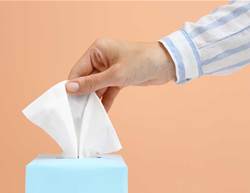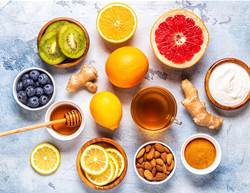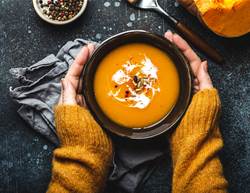1. Swap sugar for superfoods
We’ve long known sugar isn’t great for our waistlines. What’s not so widely understood? The white stuff may not be too friendly with our immune systems either. A well-known study published in the American Journal of Clinical Nutrition found that eating 100g of the stuff (think three Mars Bars) hampered the ability of white blood cells to kill bacteria for up to five hours afterwards. “While there isn’t sufficient evidence that sugar decreases immune function, what it can do is displace other nutrient-dense foods that contribute to immune health,” says accredited practising dietitian Charlene Grosse. “The best way to fight against infection is to eat a healthy balanced diet.” Flick your immunity switch with the three delicious suggestions at right.
2. Boost your fluid intake
Haven’t been to the water cooler enough today? Hydration isn’t directly linked to immunity but it does support your whole body so, when you’re dehydrated, everything from your vascular to your immune system needs to work harder. So how much should you aim for? “The ideal is eight glasses or 30ml/kg of body weight each day,” says Prevention GP Dr Joe Kosterich. “Gauge it by how you’re feeling, whether you’re thirsty, and your urine, which should be a pale straw colour.” H20 is best, but fruits like watermelon have a high water content. Hot and cold drinks count, too. Time for tea?
3. Keep an eye on the scales
Strange but true: shifting those last few stubborn kilos could actually benefit your immunity as much as it does the quest to fit back into skinny jeans. The reason? Obesity is associated with a high risk of infection and elevated levels of chronic inflammation, according to Grosse. “Maintaining a healthy body weight is one way to reduce your chance of illness,” she explains.
4. Try a DIY solution
A drippy nose when you’re unwell is a sign everything’s, ahem, running as it should. That’s little consolation when you’re stuck in a meeting minus a tissue, but mucus is your body’s way of getting rid of what it doesn’t need, whether that’s dust or a virus. “We rarely see a dry nose in isolation, unless you’re in an area that’s very hot and dusty,” says Dr Kosterich. “But if your nose isn’t clearing itself enough, try inhaling steam over a bowl or a saline spray to moisten it.”
5. Manage your stress
Picture this: you’re taking a long-awaited week of after a hectic work project, all set to relax with a G&T and that copy of Tiny Beautiful Things you never got round to finishing for book club—then you get sick. It’s no coincidence. “A combination of adrenaline and mind over matter keeps you going when you have to, then everything catches up when you stop,” explains Dr Kosterich. Just as fascinating? Carnegie Mellon University researchers in the US conducted a study that
found that the high levels of the hormone cortisol produced by prolonged levels of stress reduce the immune system’s ability to regulate inflammation, a main factor in infections and disease. The study participants who were in the high-stress camp clearly became more susceptible to colds and respiratory infection. So book in for your next massage ASAP.
6. Embrace lifestyle tweaks
The average adult picks up a couple of colds each year so if you’re getting more than your usual quota, your diet, exercise or sleep habits could be the unexpected culprit. “A virus is always the same, so it’s more about you and how you are at that particular point in time that determines whether you actually become unwell,” reveals Dr Kosterich. Genuine immune deficiencies are rare, often the result of certain meds or conditions like cancer. That’s why lifestyle changes tend to be the first port of call. Vitamin D and iron deficiencies could also play a part, he adds, so check in with your GP about possible supplements. Also fill up on D foods like oily fish and eggs, and iron go-to's, including nuts and green, leafy vegetables.










